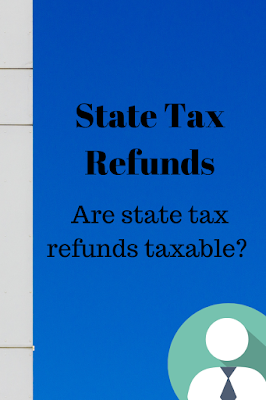 The good news is you received a state income tax return refund. The bad news is you may be liable to pay federal taxes for the state tax refund. The IRS informs U.S. taxpayers that a state income tax return may sometimes be considered taxable income. The taxability of a state income tax refund is dependent upon if you benefited from the state taxes on your federal tax return. Let me explain.
The good news is you received a state income tax return refund. The bad news is you may be liable to pay federal taxes for the state tax refund. The IRS informs U.S. taxpayers that a state income tax return may sometimes be considered taxable income. The taxability of a state income tax refund is dependent upon if you benefited from the state taxes on your federal tax return. Let me explain.Related Posts
- Are your income items taxable?
- Dividend Income: How is dividend income taxed?
- Do you qualify for the Sec. 199A QBI deduction?
State Tax Refunds
The receipt of a state income tax refund is taxable if the state income taxes paid in the tax year resulted in a tax benefit. The receipt of a state income tax refund is not taxable if the state income taxes paid in the tax year resulted in no tax benefit. This rule exists to prevent a double benefit. The IRS does not want you to claim a deduction for state income taxes and then receive a tax-free refund in the subsequent year. In effect, you must adjust the amount of the state tax refund by paying taxes on the amount to account for the federal tax deduction you claimed for the tax year. I will go into more detail on when a state tax return is taxable.When is a state income tax refund taxable income?
The taxability of a state income tax refund is dependent upon the following question: For the tax year in question, did you take the standard deduction, or did you itemize your deductions?If you used the standard deduction, the state income tax refund is not taxable in the subsequent year. You will not report the refund income for tax purposes. By taking the standard deduction, you did not benefit from the state income tax. In other words, you did not decrease your federal taxable income amount by your state income tax. The state tax refund is not taxable when you take the standard deduction.
For the tax year relating to the refund, if you itemized your deductions, the state income tax refund is taxable in the subsequent year when received. You will report the refund income as taxable income. By itemizing your deductions, you benefited from the state income tax. State income tax is an itemized deduction available to taxpayers on Sch. A. Therefore, when you itemize, you directly decrease your federal taxable income amount, creating a tax benefit. Because you are not allowed the double benefit, you must pay federal taxes on the state refund in the year received. The state tax refund is taxable when you itemize your deductions.
Example
Sam used the standard deduction on his 2019 federal tax return. In 2020, Sam received a $500 state income tax refund. Sam must determine if the state taxes created a tax benefit in 2019. By taking the standard deduction in 2019, Sam did not benefit from the state income taxes. As a result, Sam will not include the $500 state refund in his 2020 federal taxable income.In conclusion
It comes down to: standard deduction versus itemized deductions! Simply determine which deduction method you used for the tax year relating to the state tax refund. If you used the standard deduction, the state refund is tax-free. If you itemized, the state refund is taxable. It is as simple as that!I hope you gained a strong understanding about state tax refunds. You should now know when your state tax refund is taxable. Please share to help others learn the tax rules that determine if a state income tax refund is taxable or tax-free.
Please comment any questions below.
Comments
Post a Comment